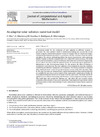Please use this identifier to cite or link to this item:
https://accedacris.ulpgc.es/jspui/handle/10553/44310
| Title: | An adaptive solar radiation numerical model | Authors: | Díaz Reyes, Felipe Montero García, Gustavo Escobar Sánchez, José María Rodríguez Barrera, Eduardo Miguel Montenegro Armas, Rafael |
UNESCO Clasification: | Investigación | Keywords: | Solar radiation Shadows Adaptive meshes Solar power |
Issue Date: | 2012 | Journal: | Journal of Computational and Applied Mathematics | Conference: | 3rd International Conference on Finite Element Methods in Engineering and Science (FEMTEC 2011) | Abstract: | A numerical model for the evaluation of solar radiation in different locations is presented. The solar radiation model is implemented taking into account the terrain surface using two-dimensional adaptive meshes of triangles that are constructed using a refinement/derefinement procedure in accordance with the variations of terrain surface and albedo. The selected methodology defines the terrain characteristics with a minimum number of points so that the computational cost is reduced for a given accuracy. The model can be used in atmospheric sciences as well as in other fields such as electrical engineering, since it allows the user to find the optimal location for maximum power generation in photovoltaic or solar thermal power plants. For this purpose, the effect of shadows is considered in each time step. The solar radiation is first computed for clear sky conditions considering the different components of the radiation. The real sky radiation is computed daily, starting from the results of clear sky radiation, in terms of the clear sky index. Maps for the clear sky index are obtained front a spatial interpolation of observational data that are available for each day at several points of the region under consideration. Finally, the solar radiation maps fora month are calculated from the daily results. The model can also be applied in solar radiation forecasting with-the help of a forecasting meteorological model. This model takes into account the shadows cast, and allows the user to make a better estimation of the amount of solar power generation. Some numerical experiments related to the generation of solar radiation maps in Gran Canaria Island (Canary Islands, Spain) are presented. | URI: | https://accedacris.ulpgc.es/handle/10553/44310 | ISSN: | 0377-0427 | DOI: | 10.1016/j.cam.2012.04.018 | Source: | Journal of Computational and Applied Mathematics [ISSN 0377-0427], v. 236, p. 4611-4622 |
| Appears in Collections: | Actas de congresos |
SCOPUSTM
Citations
15
checked on Jun 8, 2025
WEB OF SCIENCETM
Citations
13
checked on Jun 8, 2025
Page view(s)
90
checked on Mar 16, 2024
Download(s)
60
checked on Mar 16, 2024
Google ScholarTM
Check
Altmetric
Share
Export metadata
Items in accedaCRIS are protected by copyright, with all rights reserved, unless otherwise indicated.
